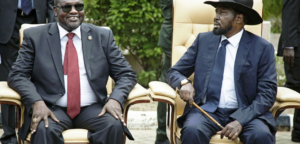- Stay Connected
South Sudan’s Leaders Made War — and Many Millions of Dollars
The two men whose power struggle sparked South Sudan’s brutal civil war in late 2013 have reaped millions of dollars over the course of the conflict, according to a two-year investigation into profiteering carried out by an NGO watchdog.
A new report released by the Sentry, an initiative cofounded by actor George Clooney and the Enough Project’s John Prendergast, outlines how President Salva Kiir, former Vice President Riek Machar, and a variety of top military officials amassed personal wealth while civilians suffered under their watch.
“The leaders of South Sudan’s warring parties manipulate and exploit ethnic divisions in order to drum up support for a conflict that serves the interests…of the top leaders of these two kleptocratic networks,” the report said.
More than 50,000 people have been killed and more than a million displaced during the conflict, which has continued despite a peace deal that Kiir and Machar both signed in August 2015. Machar returned to the capital of Juba in April in a bid to form the shaky transitional government agreed upon in the earlier peace deal, but left in July after renewed fighting broke out between his forces and those loyal to Kiir. Last week, the U.S. State Department — which backed the peace process and facilitated Machar’s return to Juba earlier this year — said he should give up the idea of again becoming first vice president, a job he was promised in the August 2015 deal.
Over the course of the conflict, Machar has repeatedly claimed — both in conversations with Foreign Policy and in other public forums — that he lacked the funds to call his troops home from the bush and thus end the conflict, demanding again and again that the United States fund his purchases of tents and food to urge men back from the battlefields. “Provide us tents, food, medicines, water so that they are assembled and they wait,” he told FP in October. “A tent is a dividend for peace.”
But according to the Sentry’s findings, Machar’s financial network is expansive, and while civilians hid in swamps and United Nations camps, his family (and at times Machar himself) resided in luxurious villas in Ethiopia and Kenya, thus avoiding the consequences of the civil war. Ironically, his newest home in Nairobi is in the upscale Lavington neighborhood, not far from one that belong to Kiir’s family. The report says Machar’s family home there “has a large backyard with a large stone patio and a teardrop-shaped, in-ground swimming pool.” Kiir and other officials from both sides have managed to invest millions of dollars in properties outside of South Sudan, despite their meager government salaries. (Kiir’s amounted to roughly $60,000 per year and Machar’s to around $54,000.)
Meanwhile, Kiir’s 12-year-old son appears on documents as holding 25 percent of interest in a company where his job title is listed simply as “son of president.” That son is one of at least seven of Kiir’s children who hold stakes in various businesses.
Both men have also used their fortunes to directly fund the brutal conflict. The report says Kiir spent tens of millions of state dollars to purchase attack helicopters, which his troops then used against civilians, as well as to recruit, train, and unleash “a private militia on civilians and rival factions within the military.” Machar, on the other hand, reportedly used an intermediary to negotiate weapons purchases from a Ukrainian company. His nephew is also accused of unlawfully taking over an east African security company’s office in Juba and seizing its property.
source: FP

